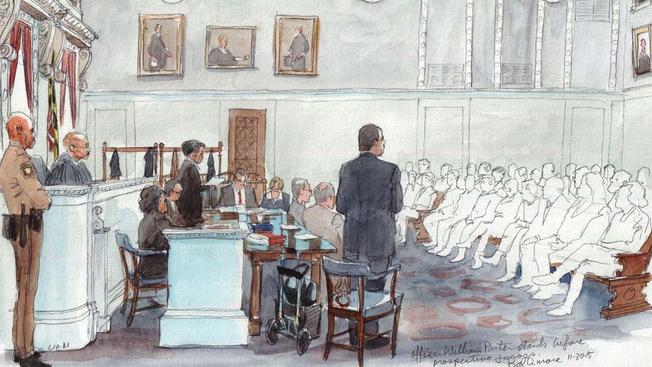Jury seated in Officer William Porter trial
Over almost three years, records show correctional officers at the Baltimore City Detention Center have refused to admit almost 2,600 detainees who were in police custody.
“He laid a hand on Mr. Gray…to help him up”, Porter’s attorney, Gary Proctor, said during his opening statements Wednesday afternoon.
Mr Porter told defence lawyers in a pre-trial filing that Gray was always “banging around”, referring to a previous arrest in which he allegedly tried to kick windows out of a police auto. Porter is accused of failing to get him medical help during several stops on the 45-minute trip.
But prosecutors say instead of calling a medic, Porter picked Gray up from the floor and placed him in an upright position on a bench without securing him with a seat belt.
Such an injury would have impacted Gray’s ability to breathe, Schatzow said.
The jury of eight women and four men was seated on the third day of a brisk selection process, given defense assertions that it would be impossible to seat an impartial panel in a city so convulsed by the case.
A defense attorney for one of six police officers charged in the death of Freddie Gray says his client should not be held responsible for simply checking on the young black man during a police van ride. Concerns also have been raised over the impartiality of a trial where media has played a large part in the character assassination of the deceased victim and of protesters who began a city-wide uprising after his death in police custody.
Jury selection for the trial of William Porter, the first of six Baltimore police officers facing criminal charges for Gray’s death, started Monday and finished earlier Wednesday.
Porter, 26, faces charges including manslaughter, second-degree assault and misconduct.
Gray’s death in April triggered rioting, arson and protests in the largely black city and fuelled a national debate over police tactics and relations with minorities.
Porter is charged with manslaughter, second-degree assault, misconduct in office and reckless endangerment in connection with Gray’s death.
The state prosecutors argued that Porter had the opportunity to help Gray, since Porter was in the van for five of the six stops, but chose not to. Gray died one week after the arrest, and his death was attributed to a spinal cord injury – though it remains unclear how he sustained it. He was unresponsive by the time he arrived at the Western District police station and died at a hospital a week later, on April 19. Three of the officers are black, three white.
Williams said he expects the trial to be complete by December 17.
Prosecutor Michael Schatzow told the jurors that Porter “is on trial for what he did, or more importantly, what he did not do”.
Porter’s attorneys have previously indicated Porter will likely take the stand.
The outcome of Porter’s case could have a major impact on Goodson’s trial, which is set to begin January 6. If Porter is acquitted, there could be protests and possibly more unrest. In August, she announced that she would not seek re-election. She said officers must sometimes “do a little detective work” to understand medical complaints, but she hopes they will have already summoned an ambulance before trying to determine why someone is saying, “I can’t breathe”.
The state’s first witness, Officer Alice Carson Johnson, taught Porter at the Baltimore police academy in 2013, and told jurors he was trained in how to respond to medical emergencies in the field.








